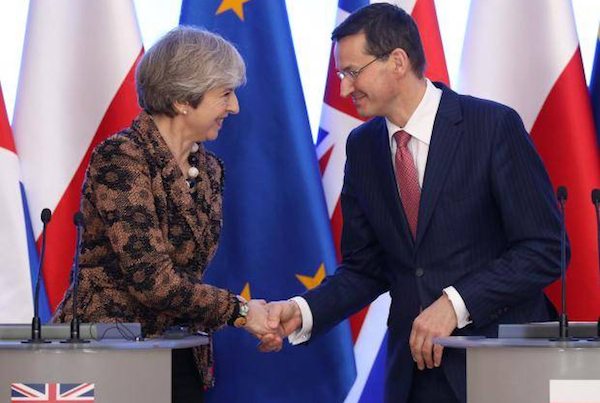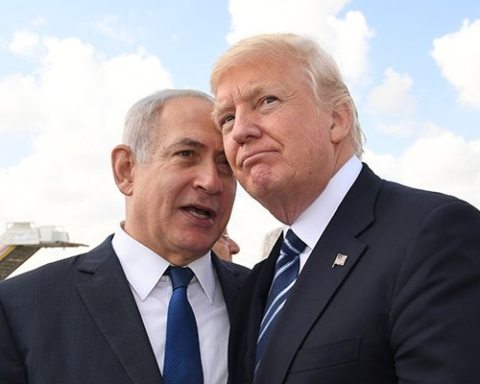Just hours after the EU began moving to sanction Poland, British Prime Minister Theresa May assured Poles that the U.K. supports them, and affirmed their right to amend their constitution. Mrs. May cemented her government’s support for Poland by signing a defense-intelligence cooperation treaty on Thursday, after promising that the 1 million Polish citizens residing in Britain would not be disturbed by Brexit.
The European Commission, lead by France and Germany, has already accused Poland’s Law and Justice (PiS) party of undermining the independence of its country’s judges and judiciary councils. And while Downing Street has said the prime minister would raise these concerns during a joint summit in Warsaw on Thursday, Mrs. May shows no signs of protesting Poland’s reforms, saying the issues are, “primarily a matter for the country concerned, not the EU”.
I am in #Warsaw today to ensure that the UK and Poland can work even more closely together to ensure the security and prosperity of our nations in the years ahead. pic.twitter.com/imcxx85g2X
— Theresa May (@theresa_may) December 21, 2017
The scheduled purpose of Prime Minister May’s visit was to sign a new bilateral security and defense treaty with Poland, which would enhance cooperation on defense training, intelligence sharing and capability development. Poland is a particularly strategic partner for Britain, for the nominal purpose of countering Russian belligerence and sharp power.
For over a decade, Europe has undergone a political shift away from its middle-of-the-road socialism and towards the far-right. This shift is evident in Poland, as the Law and Justice party gains more and more influence in the country. The rise of these groups has, in part, come as a response to the economic turmoil and slow recovery process following the 2007 financial crisis, which severely impacted the European Union. But the far-right groups were also emerging as serious political operators before that financial crisis even hit. Their emergence has been partially attributed to alleged support provided to them by the Russian government.
Various intelligence agencies and experts have said that Russia primarily supports political parties that are nationalistic and eurosceptic, typical qualities of the far-right. In 2014, France’s far-right candidate Marine Le Pen publicly accepted an $11.7-million loan from a Russian bank, according to multiple news reports. But Russia has also reportedly lent money to far-right nationalist parties in Greece, Italy, Hungary and Austria.

However, it should be noted that Poland is an exception to this phenomena. All of Poland’s political parties, including the Law and Justice party (PiS), strongly oppose Russian political influence; with resistance to Russia being a central theme to Polish history (Great Northern War, the partitions of Poland, and 20th century Soviet Domination).

As U.K. Foreign Secretary Boris Johnson prepares to visit Moscow this week, Mrs. May said the Kremlin has been trying to weaponize information and undermine a rules-based international system. “We are both [the U.K. & Poland] deeply concerned by Russia’s attempts to weaponise information,” May told reporters. “The Kremlin is seeking to undermine the international rules-based system and it will not succeed.”
Prime Minister May also assured Polish Prime Minister Mateusz Morawiecki on Thursday that any Poles living in the U.K. should not be concerned about their residency status in Britain as the country prepares to leave the European Union. Britain currently has 1 million Polish residents within its borders, which Mrs. May said were a “strong part of [British] society.”

“Poland matters greatly to the UK,” Mrs May said. “I am determined that Brexit will not weaken our relationship with Poland. Rather, it will serve as a catalyst to strengthen it.”
As the first phase of Brexit negotiations closed on Dec. 15, May has admitted that EU leaders will try to punish her country to send a message to other EU members that would like to exit the union as well.
Early indications show the EU will get most of what it wanted from Britain: a payment of 50 billion euros ($58.9 billion), full respect for the rights of EU citizens in Britain, and a commitment that Ireland’s border with the U.K.’s Northern Ireland would remain open.
“We got enormous support and solidarity from all of the other European countries,” said Irish Prime Minister Leo Varadkar, explaining why the EU was in a strong position to dictate the terms of Brexit. “The reason why the European Union got a good outcome in the talks so far is because of European unity and we now need to maintain that.”
[Title Image: British Prime Minister Theresa May shaking hands with Polish Prime Minister Mateusz Morawiecki. (Reuters Photo)]
LIMA CHARLIE NEWS, with James Fox, Diego Lynch and John Sjoholm
Lima Charlie provides global news, insight & analysis by military veterans and service members Worldwide.
For up-to-date news, please follow us on twitter at @LimaCharlieNews


![Image War in Eastern Ukraine and the New Heroes of ‘Novorossiya’ (New Russia) [Lima Charlie News]](https://limacharlienews.com/wp-content/uploads/2019/04/Donbass-MAIN-01-480x384.png)
![Image The struggle for Poland's soul [Lima Charlie News]](https://limacharlienews.com/wp-content/uploads/2019/02/The-struggle-for-Polands-soul-Lima-Charlie-News-480x384.jpg)
![Image Drop in oil prices may trigger unintended consequences [Lima Charlie News]](https://limacharlienews.com/wp-content/uploads/2018/11/main_900-480x384.jpg)





![Image War in Eastern Ukraine and the New Heroes of ‘Novorossiya’ (New Russia) [Lima Charlie News]](https://limacharlienews.com/wp-content/uploads/2019/04/Donbass-MAIN-01-150x100.png)
![Image The struggle for Poland's soul [Lima Charlie News]](https://limacharlienews.com/wp-content/uploads/2019/02/The-struggle-for-Polands-soul-Lima-Charlie-News-150x100.jpg)